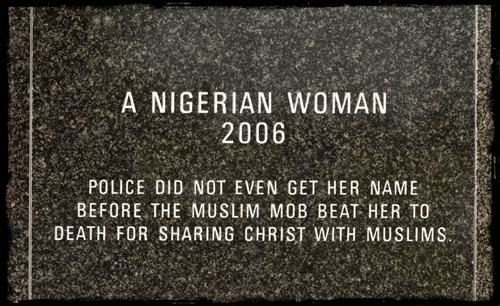Hoy nuestra escritora invitada es Tami Yeager, administradora financiera de EPM. Dada su pasión por la iglesia perseguida, también trabaja voluntariamente como coordinadora de expresión comunitaria para La Voz de los Mártires.
En el monumento a los mártires (en la sede ministerial que la Voz de los Mártires tiene en Bartlesville, Oklahoma, EE.UU.) están los nombres de muchos mártires. Cada uno representa una persona real con una historia real. Me encanta pararme cerca de este monumento y leer lentamente los nombres y sus breves descripciones. Durante una visita reciente, me vi una vez más atraída hacia el monumento. Ese día en particular, hubo una piedra conmemorativa que llamó mi atención. Decía, simplemente: «Una mujer nigeriana».
 A diferencia de los otros, en el bloque de piedra no aparecía su nombre. Había sido golpeada hasta morir por una furiosa multitud antes de que las autoridades pudieran averiguar su nombre. Me pregunto cómo era físicamente; cuántos años tenía; de quién era hija; si es que tenía hermanas o hermanos; si estaba casada; o si es que tenía hijos. Sin embargo, no sabré las respuestas a estas preguntas a este lado de la eternidad.
A diferencia de los otros, en el bloque de piedra no aparecía su nombre. Había sido golpeada hasta morir por una furiosa multitud antes de que las autoridades pudieran averiguar su nombre. Me pregunto cómo era físicamente; cuántos años tenía; de quién era hija; si es que tenía hermanas o hermanos; si estaba casada; o si es que tenía hijos. Sin embargo, no sabré las respuestas a estas preguntas a este lado de la eternidad.
Me imaginé cómo habrá sido el lugar donde vivió y qué podría haber pasado en su vida para que llegara a esa situación. Me pregunté cómo se había preparado para ese momento: ¿habría despertado esa fatídica mañana con una sensación de que sería un día diferente? ¿Era habitual para ella compartir su fe con otros? Seguramente ella sabía que hablar de Cristo con sus vecinos musulmanes tendría un costo. Supongo que lo había calculado y sabía muy bien el precio que podría pagar. Me imagino que su motivación era el amor y que el peso de éste superaba el del miedo.
¿Habrán las demás personas vuelto a sus casas en silencio a medida que las voces comenzaron a levantarse en las calles ese día? ¿Se les habrá dicho a los niños que se escondieran en la oscuridad y se quedaran quietos? ¿Habrán guardado silencio quienes creían lo mismo que ella a medida que el odio se inflamaba entre la turba que la rodeaba? ¿Habrán dejado varios días su cuerpo en el polvo de la calle como advertencia para otros que pudieran haberse visto tentados a creer lo mismo? Como Esteban en el libro de los Hechos, ¿miraba ella al cielo mientras la apedreaban? ¿Se detuvieron abruptamente los dolorosos puñetazos y patadas cuando, al partir su espíritu, respiró por última vez en la tierra y lo hizo por primera vez en el cielo?
¿Cómo habrá sido para ella abrir sus ojos y ver que ahora estaba en los brazos de aquel por el cual había entregado su vida? A la espera de recibir su túnica blanca, ¿reconoció algunos de sus cercanos? ¿Habrá escuchado luego la ovación de la gran nube de testigos que, anteriormente tan tenue, ahora se oiría con tan intensa claridad? ¿Se sintió abrumada de un gozo, una paz y una felicidad indescriptibles al escuchar al Rey decir: «Bien hecho, mi sierva buena y fiel, ahora toma tu lugar y espera un poco más»? ¿Se habrá entonces trasladado instintivamente al lugar reservado para ella, al lado de los otros de los cuales el mundo no es digno? (Heb 11:38)
Me pregunto si alguno de quienes estaban entre la multitud airada se fue ese día siendo incapaz de olvidar lo visto en ella, que fue fiel hasta la muerte. ¿Habrá habido algunos que esa noche cerraron sus ojos sin poder escapar de las imágenes que ahora aparecían en sus mentes? ¿Se habrán repetido en sus pensamientos las palabras que ella les dijo? ¿Habrá alguno de sus asesinos recibido en sueños o en visiones la visita de aquel sobre el cual ella les habló? ¿Se arrodillaron y clamaron por perdón algunos de los que la golpearon, patearon, escupieron y maldijeron? El día en que su sangre fue derramada sobre el suelo nigeriano, ¿se habrá convertido alguien así como Saulo llegó a ser Pablo?
La verdad es que, fuera de lo escrito en la piedra, no sé más sobre la historia de esta mujer nigeriana. Estoy, sin embargo, profundamente consciente de que, en muchos lugares del mundo, sufrir por causa del evangelio es el cristianismo «normal». Lo poco que sé de mi hermana nigeriana aviva en mí una pasión por darle una voz a ella y a otros en su situación. Ansío el día en que conozca a mi hermana. Entonces sabré toda su historia.
«Entonces cada uno de ellos recibió ropas blancas, y se les dijo que esperaran un poco más, hasta que se completara el número de sus consiervos y hermanos que iban a sufrir el martirio como ellos» (Apocalipsis 6:11).
Of an Unnamed Nigerian Woman
Today's guest blog is from Tami Yeager, EPM's financial administrator. Because of her passion for the persecuted church, she also serves as a volunteer community voice coordinator for The Voice of the Martyrs.
Displayed on the Martyrs Monument (at The Voice of The Martyrs USA ministry office in Bartlesville, Oklahoma) are the names of many martyrs—each one representing a real person with a real story. I love to stand near this memorial and slowly read the names and brief descriptions. During a recent visit I found myself once again drawn to the monument. On this particular day there was one memorial stone that stood out to me. It simply read A Nigerian Woman.
Unlike the others, her name had not been inscribed in the beautiful stone slab. She had been beaten to death by an angry mob before the authorities could learn her name. I wondered what she looked like, and how old she was. She was someone's daughter. Did she have sisters and brothers? Was she married, and did she have children? These are questions I will not know the answers to on this side of eternity.
I imagined what her village may have looked like and wondered what must have taken place in her life leading up to that day in 2006. I wondered how she had been prepared for that moment. Did she wake up on that fateful morning with a sense that this day would be different? Was it customary for her to share her faith with others? Surely she knew that sharing Christ with her Muslim neighbors could cost her. I believe she had counted the cost, and was well acquainted with the price one could pay. I imagine love was her motivator, and its weight far outweighed her fear.
Did people silently slip into their homes as voices began to rise in the streets that day? Were children warned to hide in the dark, and be still? As an evil hatred raged hot amongst the mob that surrounded her, did those who believed as she did stay silent? Was her body left in the dust of the street for days as a warning to others who might have otherwise been swayed to believe as she did? Like Stephen in the book of Acts, was she looking into heaven while they beat her? Were the painful blows from many fists and feet brought to an abrupt halt as she surrendered her spirit, exhaling her last earthly breath, and simultaneously taking in her first heavenly breath?
What was it like for her to open her eyes and find that she was now in the arms of the One whom she had exchanged her life for? Standing to receive her white robe, did she recognize some of those who surrounded her? Did she then hear the cheers from a great cloud of witnesses that had been ever so faint before, and now could be heard with vivid clarity? Was she overcome with indescribable joy, peace, and happiness at the sound of the King's words, “Well done my good and faithful servant, now take your place and wait a little longer"? Did she then instinctively move into the place that had been saved for her, alongside the others of whom the world is not worthy?
I wonder who among the angry mob walked away that day unable to shake what they witnessed in her. She had been faithful unto death. Were there some who closed their eyes that night unable to escape the images now playing in their minds? Were the words she spoke to them being repeated in their thoughts? Were any of those who took part in her murder later visited in dreams and visions by the One she told them about? Would some of those who hit her, kicked her, spit upon her, and cursed her later fall on their knees and cry out for forgiveness? The day her blood was spilled on Nigerian soil, was there another Saul to Paul conversion?
The truth is I do not know any more about the Nigerian woman's story then what is written in stone. I am, however, keenly aware that in many places of the world today suffering for the sake of the gospel is “normal” Christianity. The little I do know of my Nigerian sister fuels a passion in me to give her, and others like her, a voice. I look forward to the day I meet my sister. It is then that I will learn all of her story.
Then a white robe was given to each of them. And they were told to rest a little longer until the full number of their brothers and sisters—their fellow servants of Jesus who were to be martyred—had joined them (Revelation 6:11).

